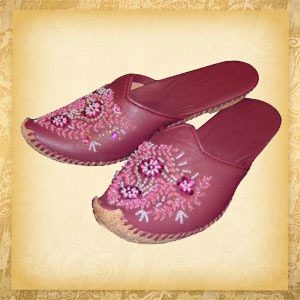

Looking through the history, wearing of slippers is closely associated with culture of life. Footwear was assorted according to purpose in the ancient civilizations of the Old East, where the first cities (urban centers) had developed.
The out of doors footwear was strictly separated from the one that was worn inside the house or temple. It was regarded as blasphemy to enter in a temple or house in the shoes worn out of doors. This attitude toward the house and the temple was preserved through the history of three monotheistic religions, except it changed a little bit in Christianity during merging of this religion with the Roman Empire. Slippers thus became a footwear that was worn exclusively in and around the house. With the arrival of the Ottomans in Bosnia, the process of urbanization began with foundation of cities of the Levantine type, where economic life was clearly separated from the family life. Slippers thus became a synonym for an urban living culture. The Bosnian word for slipper, 'papuča', is the word of Arabic origin, pronounced as 'papuš' in Persians, but it came to us in pronunciation as „papuča“. The Ottomans organized crafts into guilds, and then present craftsmen adapted to newly appointed organizations. The slipper-maker's craft was joined to boot-maker's guild, along with „mestvedzije“ (makers of soft leather indoor footwear) and „firaeldzije“.
The slipper-makers were mentioned for the first time in the registry from 1530, from which we can see that there were no so many slipper-makers, but by the second half of the 16th century, number of these craftsmen jumped. Craftsmen from this guild were located in the special street which was dubbed „Cizmedzijska carsija“, although their workshops were also settled in other parts of the Bascarsija. The workshops were built above the slipper shops.
The poorest craftsmen made their products at home and sold it to foreign tradesmen in inns or domestic traders who were known as „hafafi“ or „kavafi“. Craftsmen of the boot-maker's guild were of middle-income state, while the traders were very rich. Tools used for making slippers are basically the same as for all other crafts, which mainly process leather, („terđah“ or desk, „mušte“, „bičkije“, awls, needles, „zumbe“, „džilde“,lasts, etc.)
S.Z. Papudžijska radnja, je smještena u srcu Baščaršije u Saračima na broju 31.. Papudžijski zanat je tradicija porodice Kalajdžisalihović koja se ovim zanatom bavi još od davne 1822. godine. Duga tradicija proizvodnje sarajevskih papuča se nije promjenil ...
Saracko papucarska obrtnicka radnja "MAK" vl.Kalajdzisalihovic Ahmed, Saraci br.15 gaji porodicnu tradiciju esnafa od 1822 godine. Bavi se rucnom proizvodnjom tradicionalnih papuca i obuce od koze i drugih prirodnih materijala. u ponudi nudimo tradiciona ...